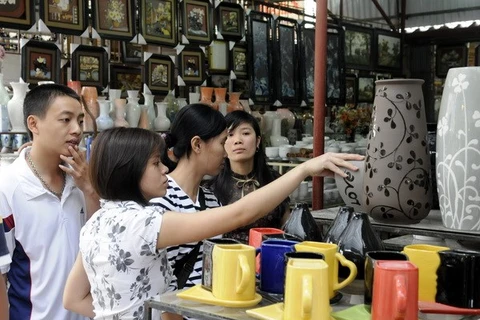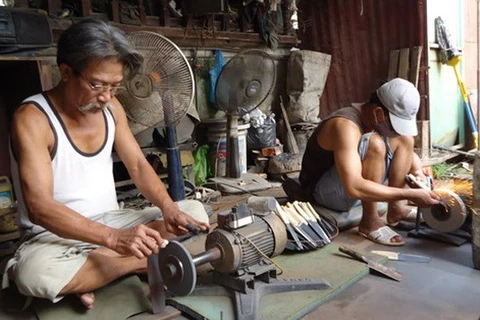Hanoi (VNA) - A roundtable discussion has been jointly organised by the Hanoi Culture Foundation, the Hanoi Industrial Design College and the Bat Trang Ceramics Guild.
It brought together business owners, ceramic designers and researchers, marketing professionals to look for a new approach for Bat Trang ceramics.
Ha Van Lam, chief of the People’s Representative board, said that during the economic boom of the 1990s and the 2000s, craftsmen in different kilns in Bat Trang sought every way to get their kiln firing and their potter’s job going. To judge a ceramic product, according to Lam, one needed to value its design, and the glaze, adding to the five traditional glazes handed down from ancestors, young craftsmen today have found out new attractive glazes.
"Our red glaze has been inspected and certified by Japanese experts as non-toxic for potters and end-users, and it has entered the demanding markets in Japan," he said.
During many export negotiations, Lam said foreign dealers told him, "Bat Trang ceramics are not as competitive in terms of design and price compared to Chinese products, but they still buy from us because we meet a certain demand from their market."
To put it more specifically, founder of Hien Van Ceramics, designer Bui Hoai Mai, said that Bat Trang craftsmen need to work together as members of a guild, where they need to agree upon certain ethics and rules, and respect each other’s turf.
"We need to understand competition in a more constructive way," he said. "If everyone is fighting to lower the price at the cost of their neighbours, we are all dragging each other downhill. You would need to make clear who is good at refined products, who can produce home appliances, who can provide construction ceramics, and everyone should recommend it to visitors. That way we can develop as a whole."
From a marketer’s point of view, Nguyen Dinh Thanh from Elite PR asked more direct questions.
"Could you create a tea cup that holds 800 years of Bat Trang history in it?"
He went further by asking questions about mapping of the two villages, Bat Trang and Giang Cao, so that visitors know where they are. There is no history board/placard with Bat Trang’s brief history on it. More importantly, there are no homestay addresses, no cafes nor even public restrooms for visitors. "All of these factors need to be taken into account," he added.
"At the village ceramics market," ceramic designer Mai said, "We see ceramics of all types and styles. A visitor will not be able to tell which product is strictly Bat Trang style."
Out in the ceramic market, it took Lam a few minutes to screen the product shelves to spot a distinctive Bat Trang glaze.-VNA
VNA






















